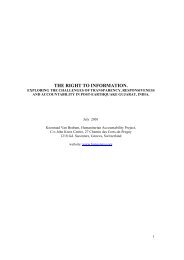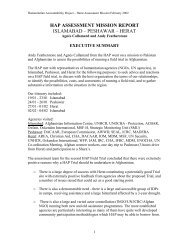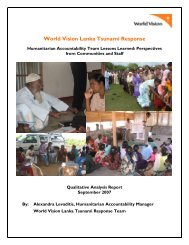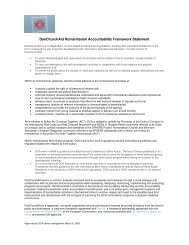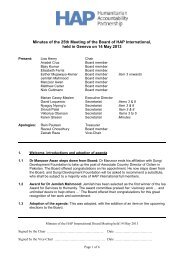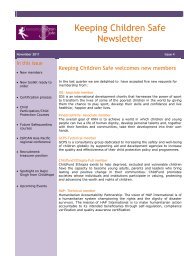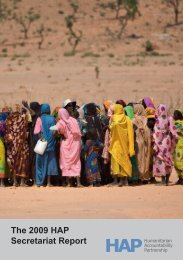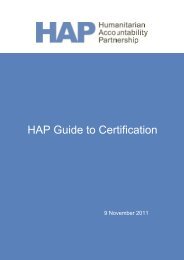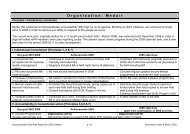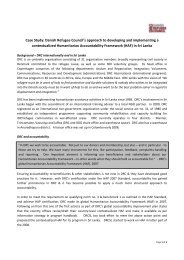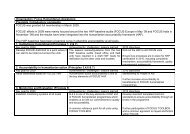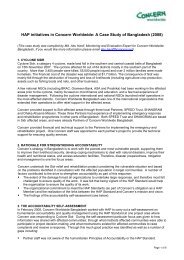Chapter Four - HAP International
Chapter Four - HAP International
Chapter Four - HAP International
You also want an ePaper? Increase the reach of your titles
YUMPU automatically turns print PDFs into web optimized ePapers that Google loves.
The 2008 Humanitarian Accountability Report<br />
20. The Women’s Refugee Commission<br />
pilot projects while also supporting an impact evaluation focusing on reducing risk to gender-based violence through economic empowerment. The Women’s<br />
Refugee Commission also reviewed whether its advocacy on the transfer of children to the Office of Refugee Resettlement has been effective.<br />
4. Addressing Complaints (Principle 6)<br />
The organisation has yet to institute a Complaints Handling Procedure, although contact information is available on fact sheets developed for beneficiary<br />
populations, translated as needed in local languages.<br />
Case Study Example: Good practice in humanitarian accountability and quality management – Summary version<br />
Example of obtaining input on reproductive health from beneficiary populations<br />
Mary (not her real name) has four children, aged 14, 12, 7 and 4. She lives with her husband and children in a makeshift hut that her husband built near her<br />
former home that was burned during the post-election violence. Mary is nine months pregnant. She does not know where she will deliver her child. She is<br />
anxious because she is unsure of what to do if she develops a complication. Her family does not have the money to take her to a health facility or pay for<br />
medical care so, if she can have a normal delivery, she will give birth at home. She will most likely deliver by herself, since there is no midwife in the<br />
community and the only traditional birth attendant in the area had fled with the violence. Mary was not aware of a clean delivery package that could help her<br />
give birth in a semi-clean environment at home. Even while she was living in the camp, she had not come across such a package.<br />
Plans with regard to: undertaking a baseline analysis, a certification audit, or mid term certification review<br />
A baseline analysis was requested from <strong>HAP</strong> in 2008, planned for January 2009<br />
21. World Vision <strong>International</strong><br />
Introductory comments: Over the course of 2008, there have been significant changes at field and institutional levels. At the field level, progress in World<br />
Vision’s Food Programming and Management Group (FPMG) performance on accountability was particularly strong, with an initial focus on pursuing<br />
certification evolving into a focus on intensive training and establishment of complaints and response mechanisms as the understanding of accountability<br />
grew. This culminated in the senior leadership of FPMG deciding that community complaints mechanisms would be part of the “go or no go” decision for all<br />
food projects by 2010. This will cover approximately 35 countries and effectively make complaints handling a normal expectation in World Vision’s<br />
humanitarian work. FPMG and H-Account have become significant partners with <strong>HAP</strong> at field level in an arrangement that has improved WV’s work,<br />
generated momentum for change and provided valuable learning for both parties. From early 2008, H-Account established the capacity to deploy to<br />
emergencies with the hiring of a second full time staff member. In response to Cyclone Nargis in Myanmar, H-Account was able to deploy to a large<br />
emergency response as part of the first wave. On an institutional level, the Humanitarian and Emergency Affairs branch of World Vision formed the Quality<br />
Assurance team to provide a formal place for Accountability where approaches can be combined with Design, Monitoring and Evaluation, Learning and<br />
Capacity Building. Most new initiatives to achieve organisational change now include elements of quality such as accountability to beneficiaries. Finally,<br />
WVI has established a Global Accountability Team to tackle beneficiary accountability issues across all programming (including development) and pursue<br />
wider accountability issues that H-Account needs to consider but has lacked the mandate to do so.<br />
121<br />
146




